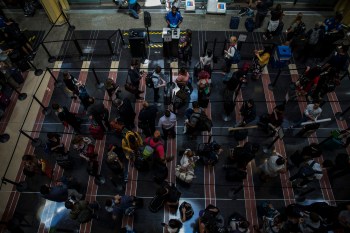Airline profits flying high
TEXT OF INTERVIEW
SCOTT JAGOW: Listen to these numbers: United Airlines, $119 million. Continental, $198 million. American Airlines, $291 million. US Airways, $305 million. Those are profits for the 2nd quarter. It’s the first time since 9/11 the legacy airlines have all made money. Richard Gritta studies the industry at the University of Portland. I asked him what the airlines are doing right.
RICHARD GRITTA: Well what they’re doing to increase their profitability is cutting way back on the costs that they can control and the big one of course of course is wages. They changing their route structures, getting more efficient, dropping some of the unprofitable routes, and they’re really putting pressure on all their workers.
JAGOW: Well as a passenger, what I see is no meals, higher fares, fewer flights. What am I getting out of the big airlines turning a profit?
GRITTA: Welcome to the cattle car in the sky. Not much, let me tell you, not much. What you’re seeing is an attempt to reduce capacity, which means the planes are flying with far more people. You know, it’s a situation where the consumer is not getting a heck of a lot out of it because fares are back up. You’re paying more, you’ve got less room and you’ve got less amenities. So I don’t see any short-term relief for the consumer.
JAGOW: Southwest is gushing cash, but the old school airlines made almost as much as Southwest last quarter. What does that tell you?
GRITTA: Well you have to understand that’s the current situation. You know, everybody was saying ‘Look at JetBlue, look at JetBlue’ and look at how they were doing a couple years ago. The vast majority of the carriers in this industry are highly over-leveraged. And when the economy’s doing well and their traffic is going up, that’s going to help them a bit. Southwest is very conservatively financed. I brought up JetBlue because all of a sudden JetBlue’s profits fell and people said, ‘But what’s the matter here?’ What’s the matter was all that debt came back to haunt them. Southwest is a model of how to finance an airline as well as how to run it operationally. And these guys now, the legacy carries, are trying to streamline to look more like Southwest. And to some extent they’ve been successful but they’re still not gonna get their costs down low enough to compete with Southwest in the long run.
JAGOW: Well a couple of the other legacy carriers, Delta and Northwest, are still in bankruptcy but are they in better shape too, along with the other airlines that are making a profit?
GRITTA: Well to the extent that a rising tide raises all the boats, yeah, because the economy is doing fairly well and air traffic is coming back. But they’re trying to get rid of all their pensions, dumping them on the taxpayer basically. If the threatened strikes at Northwest come about, the flight attendants are not very happy, you could see the liquidation of another major carrier. It’s not beyond the realm of possibility at this juncture.
JAGOW: So should we run out and buy airline stock or not?
GRITTA: Depends on whether you’re a speculator. You know I mean you can make money in highly speculative stocks but if you’re an investment-grade investor, stay away from ’em, unless you’re talking about a Frontier or a Southwest. They are highly speculative and they’re going to remain that way
JAGOW: Alright Richard thanks a lot.
GRITTA: OK
JAGOW: Richard Gritta studies the airline industry at the University of Portland. In Los Angeles, I’m Scott Jagow. Thanks for listening and have a great day.
There’s a lot happening in the world. Through it all, Marketplace is here for you.
You rely on Marketplace to break down the world’s events and tell you how it affects you in a fact-based, approachable way. We rely on your financial support to keep making that possible.
Your donation today powers the independent journalism that you rely on. For just $5/month, you can help sustain Marketplace so we can keep reporting on the things that matter to you.


















